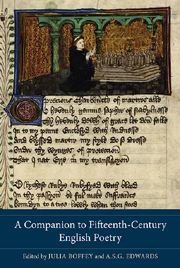Book contents
- Frontmatter
- Contents
- List of Contributors
- List of Abbreviations
- Conventions
- Introduction
- Part I Background and Context
- Part II Authors
- Part III Themes and Genres
- 11 Fifteenth-Century Chaucerian Visions
- 12 Historical and Political Verse
- 13 Classical and Humanist Translations
- 14 Romance
- 15 Scientific and Encyclopaedic Verse
- 16 Popular Verse Tales
- 17 Beyond the Fifteenth Century
- Chronology
- Index of Manuscripts
- General Index
16 - Popular Verse Tales
from Part III - Themes and Genres
Published online by Cambridge University Press: 05 July 2013
- Frontmatter
- Contents
- List of Contributors
- List of Abbreviations
- Conventions
- Introduction
- Part I Background and Context
- Part II Authors
- Part III Themes and Genres
- 11 Fifteenth-Century Chaucerian Visions
- 12 Historical and Political Verse
- 13 Classical and Humanist Translations
- 14 Romance
- 15 Scientific and Encyclopaedic Verse
- 16 Popular Verse Tales
- 17 Beyond the Fifteenth Century
- Chronology
- Index of Manuscripts
- General Index
Summary
From most vantage points the fifteenth century in England must appear to be the age of the long poem, more often than not responding somehow to Chaucer, whether directly or through the influential oeuvres of his most prolific imitators. A number of these long poems were evidently widely read, and thus ‘popular’ in the sense that they were widely transmitted and had substantial reputations: works of this kind by Lydgate, Hoccleve, Hardyng and Walton survive in some numbers, as other chapters in this book make clear. But it is probably fair to assume that readers with the means to acquire copies of such works, and the time to spend appreciating them, were from comparatively limited social strata. What do we know of verse with a more widespread appeal, whose circulation crossed social boundaries in the ways that have come to be associated with what is properly ‘popular’? (for some definitions, see Davis 1992; Putter and Gilbert 2000: 1–38).
Verse of this kind was clearly in circulation in the fifteenth century, supplying a number of devotional, instructive, social, diverting and other needs. It is, however, frustratingly hard to gain much sense of its nature, or any accurate understanding of the scale and patterns of its circulation, since one of the features most likely to have determined its popularity – shortness – must also have ensured its exiguous survival.
- Type
- Chapter
- Information
- A Companion to Fifteenth-Century English Poetry , pp. 213 - 224Publisher: Boydell & BrewerPrint publication year: 2013



